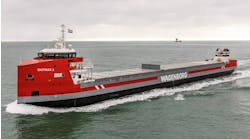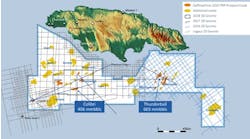The energy market’s response to the Russian invasion of Ukraine illustrates the existential importance of reliable crude oil and natural gas supply for transportation and industrial processes. The initial invasion prompted a steep rise in oil prices on the assumption that supply would be temporarily removed from the market. It also prodded nations that rely on hydrocarbon imports to rethink energy security and reliability. At the time of this writing, the US, Europe, and other nations were mulling full sanctions on Russian energy exports. This would be difficult for Europe as it depends on Russia for about 40% of its natural gas supply. Regardless of the sanctions, many nations are likely to diversify their sources of supply to tighten energy security and mitigate future disruptions. In the US, oil and gas advocates are calling on the government to implement a new 5-year offshore leasing program by the upcoming deadline to maintain investment in Gulf of Mexico resources for long-term national and global energy security. There are ample sources and suppliers that can help fill gaps in an unbalanced market, but this could be an ideal opportunity for the emerging regions that are seeking a place in the export industry. Cyprus, for example, has been actively seeking to monetize its massive offshore natural gas reserves. The impetus is even greater now with nearby Egypt adding LNG capacity to serve its customers in Asia and now increasingly in Europe. Cyprus has technical and commercial hurdles to clear, but the Cypriot government is motivated to advance offshore development, as are some of the largest international operating companies. Just last month, ExxonMobil confirmed the presence of “high-quality” gas after completing drilling operations at the Glaucus-2 appraisal well, off the coast of Cyprus. The reservoir was previously estimated to hold 5-8 tcf of natural gas. ExxonMobil and partner Qatar Petroleum are evaluating the reservoir data and potential development options. Exploration to-date offshore Cyprus and the wider Eastern Mediterranean region has found about 144 tcf of recoverable reserves, with significant upside drilling potential offshore Cyprus, Egypt, and Israel. A 2020 US Geological Survey assessment of the region estimated mean totals for conventional resources at 879 MMbbl of oil and 286.2 tcf of natural gas.
Start on page 18 for complete coverage of the emerging regions, with special focus on Northwest Africa, Southern Africa, and the Guyana-Suriname region in South America.
Meanwhile, in this issue’s ESG focus section, Jeremy Beckman reviews energy producers’ plans in Europe for placing captured carbon dioxide in depleted offshore gas fields to help governments achieve emissions reduction targets. Various projects in the North Sea and Irish Sea are in the advanced planning stage, with another, Northern Lights, already under development offshore/ onshore Norway. See page 42 for Jeremy’s story.
In the US, Talos Energy has secured a site offshore Texas for its Bayou Bend carbon capture and sequestration (CCS) project. It has an estimated sequestration capacity of 225 – 275 million metric tons of CO2.
Governments and policymakers should continue to support and encourage these CCS projects. But also, with national and global energy security at stake, governments should be working to enable and allow new investments in oil and gas development.




